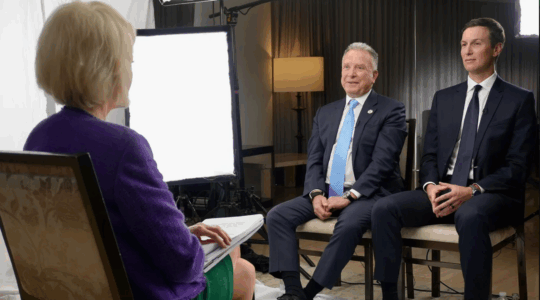WASHINGTON (JTA) — With President Obama and Israeli Prime Minister Benjamin Netanyahu set to appear at the same convention of Jewish activists, and their governments nearing a deal on the thorny settlements issue, it would seem like a great time for a sit-down.
But there’s a problem: the reluctance of the Palestinians — and by extension the Arab world — to climb on board for renewed negotiations.
The close-but-no-cigar atmosphere prevailing in Washington is what’s behind Obama’s reluctance to meet next week with Netanyahu, insiders say, although both leaders will be addressing the General Assembly of the Jewish Federations of North America in the U.S. capital.
Spokesmen at the White House and the Israeli Embassy said there are discussions about a meeting, but as of Tuesday nothing had been scheduled.
With Netanyahu set to arrive Sunday, the continuing uncertainty shocked Jewish communal insiders: No one could remember a time when an Israeli prime minister was this close to coming without a meeting in place.
“Someone’s playing chicken,” one insider said.
The sense is that Netanyahu wants a meeting and Obama isn’t so sure.
The ducking and weaving was all the more unusual for what Americans and Israelis agreed was a good meeting over the weekend between Netanyahu and U.S. Secretary of State Hillary Rodham Clinton.
Clinton came to Netanyahu’s defense when a reporter asked the prime minister at a joint press availability Sunday why Israel would not agree to a settlement freeze as a means of luring the Palestinians back to the talks. Netanyahu replied that such a freeze was never a precondition for talks, but that he was ready to impose a qualified freeze in any case.
“I said we would not build new settlements, not expropriate land for addition for the existing settlements, and that we were prepared to adopt a policy of restraint on the existing settlements, but also one that would still enable normal life for the residents who are living there,” he said.
Clinton jumped in and noted that what Israel was offering was unprecedented.
“I would add just for context that what the prime minister is saying is historically accurate,” she said. “There has never been a precondition. It’s always been an issue within the negotiations.
“What the prime minister has offered in specifics of a restraint on the policy of settlements, which he has just described — no new starts, for example — is unprecedented in the context of the prior two negotiations.”
Clinton quickly added that “for 40 years, presidents of both parties have questioned the legitimacy of settlements,” but Arab capitals were buzzing with protests within minutes.
Clinton, who was on her way to Morocco to attend a summit of Arab foreign ministers — and to make the case for increased Arab involvement in the peace process — was under pressure, insiders said, to “walk back” her statement before arriving in a lion’s den.
Hence the statement that Clinton issued Monday, saying Israel’s current offer “falls far short of what we would characterize as our position or what our preference would be.”
“But if it is acted upon,” she added, “it will be an unprecedented restriction on settlements and would have a significant and meaningful effect on restraining their growth.”
There was a degree of understanding for Clinton’s position in the pro-Israel community in Washington, and no one was ready to walk back the praise they had lavished upon her for backing up Netanyahu in the first place. The American Israel Public Affairs Committee “applauded” Clinton, and the pro-Israel lobbying group called on the Palestinian Authority and Arab states to return to talks.
If anything, pro-Israel insiders say, the relationship between the Obama and Netanyahu teams is on a good footing and improving. Obama’s officials are pleased with the restrictions Israel has lifted in the West Bank; Israel backs Obama’s strategy of containing Iran through engagement backed by the threat of far-reaching sanctions.
And the Israeli army and the U.S. European Command carried out a joint exercise Tuesday witnessed by Netanyahu, who called it “an expression of the meaningful relations between Israel and the United States.”
So what’s behind Obama’s reluctance to meet Netanyahu?
Insiders suggested that the U.S. president still feels burned by the summit he had in September at the United Nations in New York with Netanyahu and Palestinian Authority President Mahmoud Abbas that produced no results and led to sniping between the Israeli and Palestinians sides. Obama wants the promise of substance before another meeting takes place.
Ori Nir, a spokesman and analyst for Americans for Peace Now, said a frustrated Obama administration is no longer looking for a boost in peacemaking and instead simply wants to usher along whatever components of the process it can.
The problem now, said David Makovsky, a senior analyst with the Washington Institute for Near East Policy, is that Abbas faces elections in January.
“The general rule is that neither side makes concessions during an election,” said Makovsky, who has just co-authored a book with Obama’s senior Iran adviser, Dennis Ross, called “Myths, Illusions and Peace.”
Vexing the matter even further is that Abbas, while popular throughout the Palestinian areas, does not rule the Gaza Strip, where the Hamas terrorist group is in control. Hamas has made it clear that it will not allow elections, and Abbas has yet to decide whether to hold an election in the West Bank alone or to suspend polling until he reaches an accommodation with Hamas.
Clinton pressed Abbas on where he stood on whether to go to elections and more broadly on rejoining peace talks. He has yet to answer.
JTA has documented Jewish history in real-time for over a century. Keep our journalism strong by joining us in supporting independent, award-winning reporting.





